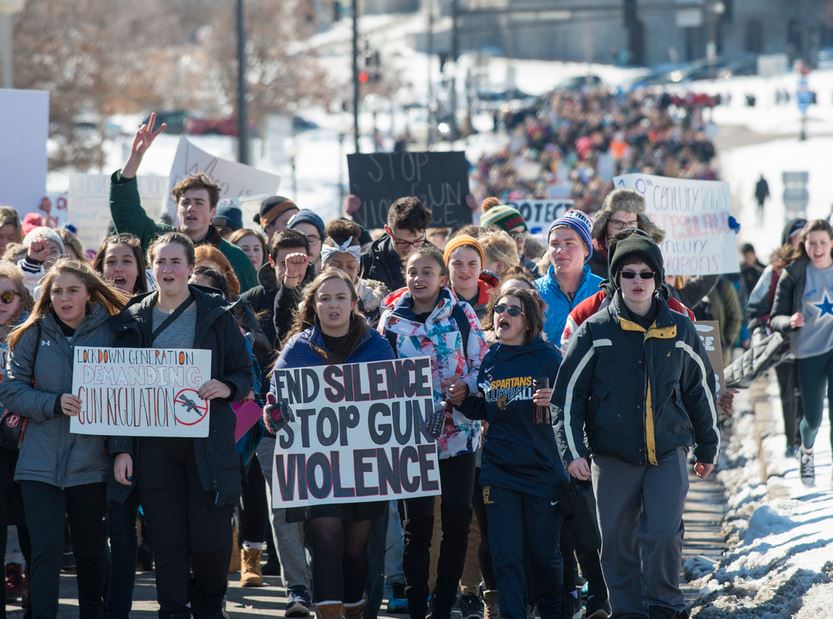Impassioned by the Marjorie Stoneman Douglas shooting that left 17 families without loved ones and a school forever changed, Cameron Kasky, Emma Gonzalez, David Hogg, and other MSD students have embarked on a crusade for stricter gun laws—and become de facto spokespersons for the anti-gun movement. With emotions still raw and wounds both physical and psychological far from healed, the students have unleashed a torrent of vitriol on all parties they think contributed to their tragedy: gun manufacturers, gun-rights advocates, companies that do business with them, lawmakers, and regular gun-owning Americans.
The reaction of these young people to the heinous violence they experienced six weeks ago has rightfully been met with sympathy. But the anti-gun movement’s elevation of these students to the status of celebrities merits scrutiny.
The Hubris of Youth
Kasky and his classmates, driven by grief, anger, and the hubris of youth, have become mascots for the anti-gun movement and darlings of a national media that aids it. Beginning with interviews in the hours after the shooting and a CNN town hall event, their words have been conferred an unearned gravitas.
Age itself does not disqualify a person from contributing a valid argument, but these particular teenagers are acting in response to trauma, and their arguments show it. One line that I suspect will haunt Kasky was delivered in an interview with National Public Radios’s Noel King on the eve of the “March for Our Lives.” Asked what he has to say to teens with views that differ from his own, teens who enjoy shooting guns for sport, for example, Kasky responded that he would tell them, “We’re marching to protect you from other people like you who have guns.” The line betrays an impulsive authoritarianism that’s been fueled by tragedy, but critically—distressingly—encouraged by a movement that has greedily used the students to further its own message.
The continued presence of Kasky and his peers in the press implies that opinion-makers think the students’ views not only matter but should matter to the exclusion of others because they have been struck by tragedy. With each successive interview, the acrimony from the teens, not toward the assailant, but toward peaceful Americans is ratcheted higher. Kasky followed his we’re-protecting-you-from-people-like-you line with an even more accusatory barb, saying to youngsters who enjoy target practice, “We are the targets now. We are running away from people like you.”
Ten years on from my own teenage years, I’m thankful that my views during that time of self-formation weren’t broadcast around the globe. I’m sure I’ll look back in another decade upon some of the views I hold today with the same discomfiture. Kasky, Gonzalez, and Hogg didn’t ask to be thrust into the spotlight and no ire need be directed toward them individually, but ire indeed belongs with the bloodhounds who have furthered their agendas on the back of teenage anguish.
Appeals to Emotion, Not Facts
I do not doubt that the teens who led the “March for Our Lives” hold their beliefs sincerely—my contention is that the wider anti-gun movement is shamelessly using the teens to erect an intellectual shield. What sort of person, every cover photo and interview latently ask, could possibly be against these poor kids? This tactic stifles credible commentary in much the same way as we see advocacy for lower military budgets smeared as unpatriotic. It is the employment of emotion to cow rational dissent.
What Kasky and his peers seem not to have had time to learn in the whirlwind of their media tours, marches, and walkouts is that gun murders have, in fact, plummeted over the course of the last 30 years. And though each is an atrocity in its own right, even school shootings show no statistical uptick. According to research from Northeastern University, in contradiction of our current moral panic, there have been only eight shootings that have killed four or more people at K-through-12 schools in the United States in the past 20 years. But the availability heuristic has won the day and instead of hearing the truth—that violence has precipitously fallen—students are being told they’re living through an epidemic of unparalleled danger.
Should this information dull the pain felt by Kasky, his schoolmates, and the families of the slain? Of course not. But it should influence our policy discussions, which have unfortunately taken on a tone of hysteria. Gun laws are by no means out of bounds for public discussion, and it is valid to use recent events to illustrate flaws in our system, but the leveraging of emotion—both that felt by the Marjorie Stoneman Douglas survivors and that which it evokes from the public—detracts from the quality of our national discourse. To the survivors of the Marjorie Stoneman Douglas shooting, we owe compassion, but to ourselves, we owe a sober and fact-based approach to policy.
—
Jordan McGillis is a policy analyst at the Institute for Energy Research. Follow him on Twitter @jordanmcgilllis. This article was originally published on FEE.org. Read the original article.
[Image Credit: Flickr-Fibonacci Blue (CC BY 2.0)]
















Leave a Comment
Your email address will not be published. Required fields are marked with *